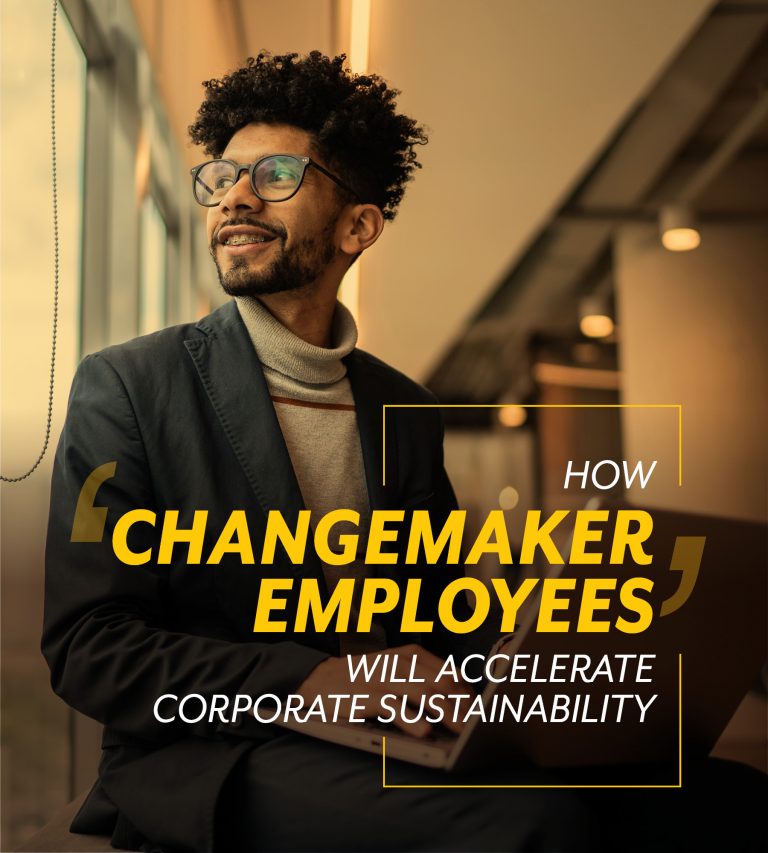How changemaker employees will accelerate corporate sustainability
Well-intentioned corporate impact goals don’t necessarily translate into tangible results. Sustainability starts with transformation driven from within.
This article originally appeared in The CEO Magazine.

For a company to thrive in our fast-changing world, it not only needs a strong sustainability strategy but also a strong culture of impact.
Ashoka’s Changemaker Companies defines a culture of impact as: “A density of employees in an organization – across all levels and positions – having the knowledge, skills and pathways to contribute to positive social and environmental impact in all aspects of the business.”
This includes talent development, research and development, manufacturing of products and services as well as procurement and sales.
Fostering a culture of impact ensures that employees have awareness of societal issues, feel ownership of their company’s sustainability goals, and have safe spaces and autonomy to contribute creative solutions to new ways of thinking and working.
It’s a business environment where employees are changemakers, aiming to make their company and world better through creative solutions.
Could it be that a density of changemakers leads to better sustainable outcomes or that companies with high sustainability attract more changemakers?
Having developed a tool that analyzes LinkedIn data across company workforces, Ashoka found a strong correlation between the sustainability performance of companies and the number of employees self-identifying as initiators and drivers of change.
Leveraging LinkedIn data and insights, drawn from over 40 years of building the field of social entrepreneurship, Ashoka discovered that the top 10 sustainable companies, according to Corporate Knights’ 2023 Index and GlobeScan’s 2023 Sustainable Leaders report, showed on average a 10 percent density of employees initiating and activating change, which is three times the industry average.
These companies have more workers self-identifying as ‘intrapreneurs’, ‘founders’ and ‘co-founders’ and showing societal contribution through changemaking activities on their LinkedIn profiles.
Could it be that a density of changemakers leads to better sustainable outcomes or that companies with high sustainability attract more changemakers? Ashoka aims to explore this question in collaboration with companies and research partners.

CHANGEMAKING IN ACTION
Changemaking by definition requires adopting a purpose mindset. This is a set of beliefs that enable people to optimize their lives to be fulfilled and in service to society and the planet. Employee changemakers are finding this sense of fulfillment and service in large part within their workplaces.
They have found ways to connect their individual fulfillment to their organization’s values and purpose. Ashoka Fellow Aaron Hurst has been leading research on purpose-oriented workers since 2015. His annual Purpose Index found that workers who adopt a purpose mindset consistently outperform their peers across several indicators:
• 20 percent longer expected tenure.
• 50 percent more likely to be in leadership positions.
• 47 percent more likely to be promoters of their employers.
• 64 percent higher levels of fulfillment in their work.
Furthermore, purpose-oriented employees are stronger brand ambassadors; they have an employee net-promoter score of 30 versus –64 for other employees.
When companies design their cultures for purpose-oriented workers, they are essentially supporting their employees to go beyond the ‘call of duty’ by tapping into their inner fulfillment. They are more likely to identify and drive new ideas, collaborate differently and be at one’s highest performance to integrate positive impact into business. This is changemaking in action.

Jean-Philippe Courtois, Executive Vice President and President, National Transformation Partnerships, has helped to initiate several programs to grow a community of changemakers both inside and outside of Microsoft.
‘Leadership for Positive Impact’ includes training senior executives on the mindsets, needs and challenges of social entrepreneurs, as well as on coaching and mentoring skills. Employees and social entrepreneurs are then paired to work together on win–win projects related to innovating new AI-powered tech solutions for positive impact oriented toward Microsoft’s clients.
In addition to Microsoft, Ashoka’s Changemaker Companies has a portfolio of a dozen corporate partners all experimenting with employee-led changemaking.
CEOs and executives see the benefits of creating an enabling environment for changemaking inside their companies, including new ways of looking at business challenges, as well as the positive benefits on skill development, especially on agility, empathy, teamwork and leadership.
To be working for a company that supports changemaking also leads to enhanced feelings of engagement and pride.
“I learned about agility in the startup arena as well as how to be successful via collaborations,” describes a beneficiary of a training program for employee changemakers – a supply chain executive for a healthcare company – of the impact.
“While working with social entrepreneurs I realized my own desire to take social responsibilities, which creates a powerful bond to my company.”
Sébastien Bossard, the CEO of Kersia, a global leader in biosecurity and food safety, says his company had an objective to train at least 15 percent of employees across the world to be changemakers.
“Why 15 percent? Because we know that’s the threshold that allows us to transform as a company and to equip our employees to meet the challenges of the future,” he explains.
WHY A CULTURE OF IMPACT?
The macro shift required for business to adopt a culture of impact – where employees across all levels and positions are initiating and driving positive impact – is synonymous with past business transformations.
For example, the digital revolution during the latter half of the 20th century required workers to learn new skill sets in addition to shifting mindsets and culture inside business to support a networked and tech-driven society.
Furthermore, just like we know employee advocacy outperforms marketing department advocacy, the impact from employee-led changemaking will outperform the impact from CSR or philanthropic programming.

The macro shift required for business to adopt a culture of impact – where employees across all levels and positions are initiating and driving positive impact – is synonymous with past business transformations.
Everything starts with an idea, then a team is formed that can end up producing something huge that can influence how business serves society. In turn, this deepens employee bonds and employee engagement.
Investing in employee-led changemaking unleashes a powerful peer-to-peer multiplier effect across an organization. This is because changemakers attract other changemakers; they continuously build and activate teams of internal and external stakeholders around them.
Companies will remain competitive and resilient to the extent that they commit to ambitious sustainability strategies, but also prioritize building cultures and systems – and uplifting organization-wide skills and values – that allow all employees to contribute to a thriving society and planet.
Ultimately, this will differentiate companies that are truly ready to ‘walk the talk’ and authentically transform their workplaces and business operations.